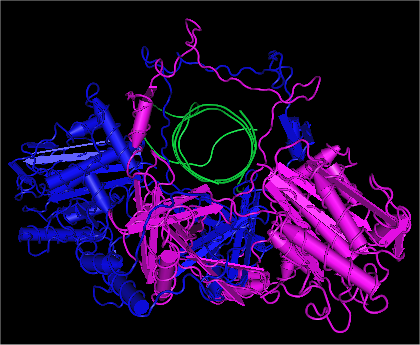What is the futur (if any) of biotech patents? What did the Bilski ruling change? Did it change something at all? I’m not a specialist, but I’ll give it a try. First, this posting will adress the question about the definition of what patenting the living means. In another one, I’ll try to go more into some historical details and their importance for the futur of biotech patents.
Science
Journal club: Papers to read from BMC Bioinfo, PNAS, Science
StandardAfter several airport adventures because of French air controllers’ strike on Tuesday, September 7, I’m back. Here are a bunch of papers which just came out:
EMBO meeting special session: The intelligent brain – does sexe matter?
StandardThis is a summary of the talk Prof. Richard Haier gave on September 6 titled The new science of intelligence: men, women and brains. There are various things I do not agree with. However, I will not comment on them in this posting to let everybody read what Prof. Haier said and not what I think about what he said.
Contrary to myth, intelligence can be defined and measured. Intelligence tests scores are related to brain features. Genetic and epigenetic influence on intelligence can be assessed: intelligence is thus 100% biological. The talk was organized as follows:
- Examples of people with extraordinary intelligence;
- Measuring intelligence;
- Brain localisation of intelligence;
- Gender-specific intelligence.
EMBO meeting day 2: Plenary lectures on human enhancers discovery and synthetic biology
StandardToday begins with the session Systems biology & functional genomics. Here are some notes from those I was really interested into. The abstracts for all the talks can be found on the EMBO meeting dedicated page.
EMBO meeting day 1: Innovation forum and mobility for scientists
Standard Today was the first day of the EMBO meeting. I already told a bit about the opening session; some words below go to the Innovation forum held in the very beginning of this first interesting – and quite exhausting – day.
Today was the first day of the EMBO meeting. I already told a bit about the opening session; some words below go to the Innovation forum held in the very beginning of this first interesting – and quite exhausting – day.
Exclusive: opening of the EMBO meeting in Barcelona, Spain
StandardI haven’t said it yet, but I’m at the EMBO meeting in Barcelona (Spain) at the moment. I’ll attend some exciting workshops and lectures, but – last but not least – I’ll present a poster at the session dedicated to Genomics and Computational Biology on Tuesday. The satellite session is finished now and the opening talks and lectures took place after 6 pm in the Auditorium of the Palau des Congressos. Some impressions below 🙂
Bookmark: BioMed Central launches a new initiative to promote data sharing
Standard BMC Researcher Notes’ latest editorial titles A call for BMC Research Notes contributions promoting best practice in data standardization, sharing and publication. It announces a new initiative aiming at promoting best practice in sharing and publishing data, with a focus on standardized, re-useable formats. Thus, data from original research project described by precised Data Notes will be made publicly accessible and, along with, an example dataset will be included.
BMC Researcher Notes’ latest editorial titles A call for BMC Research Notes contributions promoting best practice in data standardization, sharing and publication. It announces a new initiative aiming at promoting best practice in sharing and publishing data, with a focus on standardized, re-useable formats. Thus, data from original research project described by precised Data Notes will be made publicly accessible and, along with, an example dataset will be included.
This great initiative is a new step towards open data and research reproducibility!
Read the original announcement from BMC.
Brevia: Welcome to PLoS Blogs!
StandardLiz Allen announced the official PLoS Blogs today:
The launch of this network is a natural extension of the support that PLoS has always offered to bloggers in recognition of the excellent work that they do in bridging the gap between scientific and medical articles and mainstream media headlines.
Bookmark: Foldit, biology for gamers
Standard In the very latest Nature issue (August 5), a paper presents Foldit which is a program for predicting protein structures. But it’s kinda special program: better say, it’s a multiplayer online game. Thus, its leitmotiv is “Solve puzzles for science”.
In the very latest Nature issue (August 5), a paper presents Foldit which is a program for predicting protein structures. But it’s kinda special program: better say, it’s a multiplayer online game. Thus, its leitmotiv is “Solve puzzles for science”.
Bookmark: Bethesda statement on Open Access publishing
StandardIt can be read here. A translation in French is also available.
Bookmark: The third reviewer
StandardIl s’agit d’un forum pour scientifiques où ils peuvent commenter des papiers récemment publiés. Un peu comme un Journal club. Pour l’instant, le thème ayant le plus d’articles est Neurosciences, mais la Microbiologie commence à arriver aussi.
Le (très) mauvais point : les articles non open access ne présentent que les abstracts (résumés). Donc, si on n’a pas accès au journal, c’est loupé pour lire le tout.
Bookmark: Microarray analysis
StandardNice and short article in PLoS Biology about microarray analysis: Genome-scale hypothesis scanning, Gibson G (2003) Microarray Analysis. PLoS Biol 1(1): e15.
